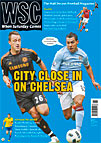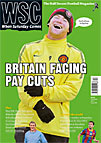 Dear WSC
Dear WSC
Congratulations on the article about match-fixing (Crimes and misdemeanours, WSC 283). Paul Joyce did a superb job reviewing the many different cases of corruption in European football. As the German police investigation began, partly because of the controversy around my book, The Fix, I did want to take him up on one issue. He mentioned that “Germany lies second in the match-fixing table” – this is true but it is not because corruption is more prevalent in German football. Rather it is because the German authorities are now, after years of denial, actually taking the issue seriously and are vigorously investigating match-fixing – and the more they investigate, the more they find. This proactive attitude is in stark contrast with British football authorities who seem to have adopted the attitude of “don’t know, don’t want to find out”. The circumstances in British football are similar to other European countries: thousands of relatively badly paid players; lots of poor clubs and lots of interest in the gambling markets. However, the British authorities have not yet fully woken to the dangers. I can only hope that they do before they discover a similar problem to the one in Europe.
Declan Hill, Oxford
Read more…
 The British press reflect on the controversy surrounding England’s 2018 World Cup bid
The British press reflect on the controversy surrounding England’s 2018 World Cup bid